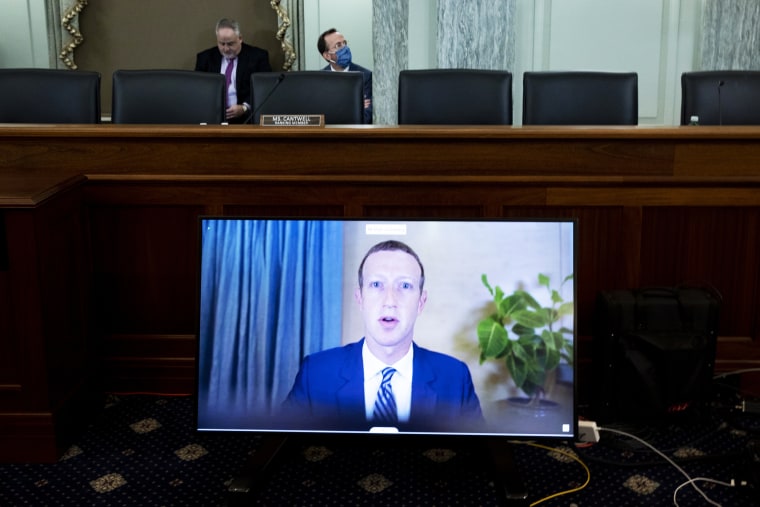Twitter CEO Jack Dorsey, Facebook CEO Mark Zuckerberg and Alphabet CEO Sundar Pichai testified before the Senate Commerce Committee on Wednesday about their content moderation practices, in a hearing that Sen. Ted Cruz, R-Texas, promoted like a boxing match; indeed, the event was a circus.
Instead of holding the tech titans accountable for their broad decisions, showing any command of how these platforms are reshaping all aspects of everyday life for Americans, or even sticking to the topic at hand, this hearing — like other Republican-led tech hearings in the Trump era — devolved into a banal session of complaining about the alleged suppression of specific conservatives and conservative posts on social media.
These stories of alleged suppression tend to be simply anecdotal because the facts simply don’t back up sweeping assertions. We at Media Matters have done study after study after study after study showing that conservative content on Facebook receives significantly greater engagement than other content. The New York Times’ Kevin Roose has shown that the top-performing link posts on U.S. Facebook pages are dominated by conservatives like President Donald Trump, conservative podcaster and Daily Wire co-founder Ben Shapiro and Fox News contributor and conservative news aggregator Dan Bongino.
In fact, the examples that conservatives give of alleged censorship are usually just examples of individuals breaking the rules or not knowing how social media works.
Take the hearing's focus on the New York Post’s temporary ban from Twitter, which has become a cause célèbre in recent days in right-wing circles. Contrary to widespread belief on the right, Twitter did not take action because it disagrees with the paper’s content, but rather because an article shared by the Post’s Twitter account contained personal contact information, in violation of Twitter's explicit rules, and the company refused to remove the tweets. Twitter took similar action against Splinter News a few years back for sharing White House adviser Stephen Miller’s personal information; conservatives did not complain at the time.
Thus, those claiming censorship are just working the refs.
The thing is, though, that there is evidence many of the refs at these companies want to be worked. Executives at Alphabet, Facebook and Twitter have all reportedly cozied up to Republicans in the last four years.
Facebook in particular has a long history of caving to right-wing pressure — going back to 2016. Facebook executives have held multiple meetings with top conservatives, made Breitbart a trusted news partner and changed the Facebook algorithm to avoid cries of censorship from the right. They even went so far as to intentionally suppress news from progressive sites like Mother Jones on the Facebook news feed in order to elevate conservative sources.
The examples that conservatives give of alleged censorship are usually just examples of individuals breaking the rules.
And while conservatives claim censorship is rampant on the platform, the hard truth is that Facebook has an active Republican operative — vice president of public policy Joel Kaplan — at the center of these stories who repeatedly sided with right-wing misinformation peddlers.
It was Kaplan who set up the 2016 meeting between Zuckerberg and prominent right-wing media personalities like Tucker Carlson and Laura Ingraham in order to assuage their concerns about anti-conservative bias in Facebook’s trending topics. Facebook’s own internal report had found “no evidence of systematic political bias” in the trending topics section, yet, following the meeting, Zuckerberg mollified his right-wing critics by replacing the humans editors of the Trending Topics section with an algorithm that was much more susceptible to manipulation. Indeed, that singular change significantly contributed to intensification of the fake news crisis of 2016 and regularly resulted in increased misinformation in users' feeds.
Four years later, Kaplan continues to shape Facebook’s policies into advocacy tools for right-wing chicanery and partisan interests.
Kaplan made an effort to “protect” Breitbart's account from being downsized in the news feed despite its distribution of harmful misinformation. Kaplan reportedly defended keeping up a network of fake news pages because removing them would “disproportionately affect conservatives.” Kaplan also reportedly defended basing Facebook’s algorithm on “super-sharers” — who are mostly extremely partisan — instead of regular Facebook users. And Kaplan shut down efforts to address polarization and extremism on the platform.
In his spare time, Kaplan remains a Republican operative; most infamously, he helped shepherd through Brett Kavanaugh’s Supreme Court nomination through the Senate.
But before working at Facebook, and even before working in George W. Bush’s White House, Kaplan was infamous for his participation in the so-called Brooks Brothers Riot during the aftermath of the 2000 election. That was when Kaplan, current American Conservative Union chairman Matt Schlapp, veteran GOP strategist Rory Cooper and other Republican operatives posed as normal Floridians and interrupted the ongoing Florida recount effort.
That the key decision-maker at Facebook for election-related matters once engaged in a partisan effort to literally stop votes from being counted in order to affect the outcome of an election should alarm everyone both inside and outside of Facebook. Kaplan is a virtually unchecked key figure for these matters at the company as we head into an election in which the integrity of the outcome will be under assault
We all recognize the risks to the integrity of our election that Facebook’s lack of action toward misinformation could pose. But few want to discuss the reality that Facebook’s facilitation of extremism and right-wing misinformation is much more a feature than a bug.
It’s long past time we have an honest and adult conversation about the roles of these big technology companies in our lives. That can’t happen when senators are focused on mean tweets — or when the companies hire partisan, dishonest operatives and give them a leading voice in the dissemination of news.




